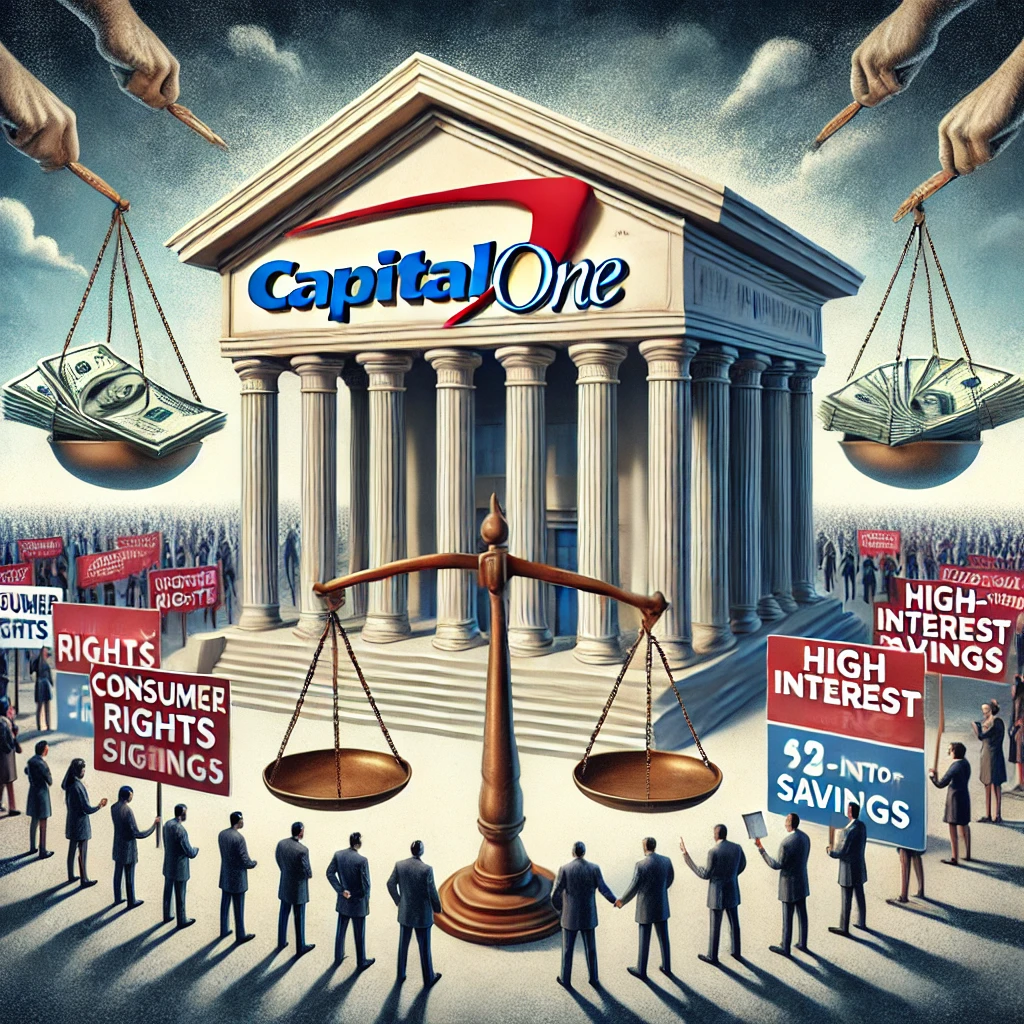In early 2025, the Consumer Financial Protection Bureau (CFPB), a prominent U.S. financial watchdog, filed a lawsuit against Capital One Financial Corporation, alleging that the banking giant engaged in deceptive practices regarding its high-interest savings account offerings. The lawsuit accuses Capital One of misleading consumers and causing over $2 billion in lost interest payments. This case not only underscores regulatory challenges within the financial sector but also raises critical questions about consumer trust and accountability in banking.
Background of the Allegations
The lawsuit, filed in a federal court in New York, alleges that Capital One employed misleading marketing strategies to attract consumers to its high-yield savings accounts. The CFPB claims that the bank failed to honor advertised interest rates, subjected consumers to hidden restrictions, and imposed hurdles for account upgrades. These practices allegedly led customers to earn significantly lower returns on their deposits than promised (CFPB, 2025).
Richard Cordray, a former CFPB director, commented, “This case highlights the importance of transparency and fairness in the financial industry, where trust is the cornerstone of customer relationships.” If proven, the allegations could indicate systemic issues in Capital One’s operations, reflecting broader challenges in ensuring ethical practices in the competitive banking sector (Reuters, 2025).
Legal and Ethical Implications
The CFPB’s lawsuit highlights several potential violations of consumer protection laws. Key accusations include:
- Misleading Advertisements: The CFPB contends that Capital One advertised high-interest rates without adequately disclosing conditions or limitations, such as minimum deposit requirements or caps on interest accrual (CFPB, 2025).
- Failure to Notify Customers of Rate Changes: The watchdog asserts that Capital One made unilateral changes to interest rates without providing sufficient notice, preventing customers from making informed decisions about their savings (AP News, 2025).
- Barriers to Account Upgrades: Some customers reported difficulties in transitioning to accounts with higher advertised rates, with customer service roadblocks contributing to lost interest opportunities (Bloomberg, 2025).
These actions may breach federal regulations, including the Truth in Savings Act (TISA), which mandates transparency in financial institutions’ disclosures of interest rates and associated terms.
Consumer Impact
The CFPB estimates that Capital One’s alleged practices deprived customers of more than $2 billion in interest earnings. For individual savers, especially those with significant deposits, this represents a substantial financial loss (Reuters, 2025). The impact is particularly acute for retirees and low-income customers who rely on interest income to supplement their budgets.
The allegations also risk eroding consumer trust in the banking system. Surveys consistently show that trust is a key factor in consumers’ choice of financial institutions. Cases like this may lead customers to question the integrity of even well-established banks, prompting increased scrutiny of advertised rates and terms (Forbes, 2025).
Industry Context
The allegations against Capital One come amid heightened regulatory attention on the financial industry. Rising competition among banks and fintech companies has driven institutions to aggressively market high-yield products, creating a fertile ground for potential misrepresentations.
Experts suggest that such cases highlight the need for stronger oversight and clearer guidelines for financial marketing. “As consumers demand better returns in a high-inflation environment, financial institutions must balance competitiveness with compliance,” said Dr. Laura Fineman, a professor of finance at New York University (NYU Research, 2025).
Response from Capital One and Industry Observers
Capital One has denied the allegations, stating that the bank operates in full compliance with all applicable laws and that it remains committed to providing value to its customers. In a public statement, the company asserted, “We believe these allegations are without merit and intend to vigorously defend against them in court” (Capital One Statement, 2025).
Industry observers, however, note that the lawsuit could have broader implications. If the CFPB succeeds, it could lead to increased regulatory scrutiny across the sector, compelling other banks to reevaluate their marketing and operational practices (Financial Times, 2025).
Potential Outcomes and Implications
The case against Capital One is likely to have far-reaching consequences, including:
- Financial Penalties: If found guilty, Capital One could face significant fines and be required to compensate affected customers for lost interest.
- Reputational Damage: Allegations of deceptive practices can harm a bank’s reputation, leading to customer attrition and difficulty attracting new clients (Forbes, 2025).
- Regulatory Precedents: The case may set a precedent for stricter enforcement of transparency rules in financial product marketing, benefiting consumers in the long run.
Conclusion
The CFPB’s lawsuit against Capital One underscores the critical importance of transparency and ethical practices in the banking sector. As financial institutions vie for consumer deposits, maintaining trust through honest and fair dealings is paramount. This case not only serves as a potential turning point for regulatory practices but also as a reminder to consumers to scrutinize financial offerings carefully. Whether the lawsuit results in significant penalties or systemic changes, it represents a critical moment for consumer protection in the evolving financial landscape.
This legal battle between the CFPB and Capital One will be closely watched, as it has the potential to reshape industry norms and reinforce the fundamental principles of accountability and fairness in banking.
References
- Consumer Financial Protection Bureau (CFPB). (2025). CFPB files lawsuit against Capital One for deceptive practices. Retrieved from www.consumerfinance.gov
- Reuters. (2025). Capital One accused of misleading consumers on high-yield savings accounts. Retrieved from www.reuters.com
- AP News. (2025). U.S. watchdog sues Capital One over high-interest savings accounts. Retrieved from www.apnews.com
- Bloomberg. (2025). Regulators take aim at Capital One’s deceptive practices. Retrieved from www.bloomberg.com
- Financial Times. (2025). Banking industry faces scrutiny after Capital One lawsuit. Retrieved from www.ft.com
- Forbes. (2025). Implications of the CFPB lawsuit on consumer trust in banking. Retrieved from www.forbes.com

By: Donte Nelson


